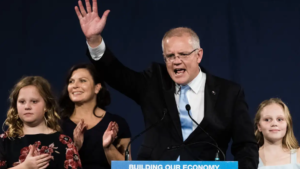Home » Commentary » Opinion » PM is a serious man for serious times
· Australian Financial Review
 Exactly a year after his surprise election victory, Scott Morrison enjoys overwhelming popular support. By acting quickly against the pandemic, his government has flattened the curve of infections. And although a second wave remains a danger, the worst of the health crisis is over.
Exactly a year after his surprise election victory, Scott Morrison enjoys overwhelming popular support. By acting quickly against the pandemic, his government has flattened the curve of infections. And although a second wave remains a danger, the worst of the health crisis is over.
As a result, Morrison looks like a new man. The hunched, hunted Prime Minister of last summer has been replaced by a confident and reassuring figure.
The truth is that leaders often do relish crises. Bob Hawke never felt more energised as prime minister than he was during the Gulf crisis in 1990-91. John Howard was always at his most animated when he could place himself at the centre of a high drama, whether it be during the East Timor mission in 1999 or after the Bali bombings in 2002.
Morrison now finds himself thrust into the role of a war-like leader against a virus-induced economic downturn and it has galvanised him like no other event of his 20-month tenure. The accidental prime minister has successfully projected himself as a serious leader for serious times.
The $230 billion economic rescue scheme was the work of many minds in the Treasury, RBA and PMO, but Morrison has been able to stamp his name on it and, unlike his predecessor, he is able to project himself as decisive. Canberra’s response has been widely hailed across the nation even by his political opponents and is being held up abroad as a template for other governments to copy. Importantly, Morrison has brought the nation with him.
All that being said, the public mood is likely to get much blacker as the economy turns down. Even on the more optimistic forecasts, joblessness will grow to double digits in the coming months. A sharp, deep contraction looms. Debt will explode. By September, the JobSeeker payment is due to halve and the JobKeeper wage subsidy expires.
Alas, the coronavirus crisis has given a worrying boost to those who say the state is the only feasible guardian of our prosperity. But a high taxation-big spending and inward-looking agenda would erode competitiveness, demotivate individuals and cause more unemployment.
In the midst of the gravest crisis in generations, Morrison has extraordinary leverage to shape Australia for good.
The fact is that, unless the intellectual case for market reforms and free trade is made rigorously and repeatedly, there will be a tendency towards massive state intervention via higher taxation in the marketplace. And that, inevitably, will retard our economic recovery.
It’s against this background that Morrison and Treasurer Josh Frydenberg plan to fire up Australia’s entrepreneurial spirit. Their public comments indicate they believe the large and massive expansion of the state is just temporary. Moreover, they recognise that a long-term strategy for free-market growth and job creation will help Australia bounce back from the crisis.
Implementing structural productivity-enhancing reforms will demand leadership and skill of the highest order. Why not end our over-reliance on incentive-sapping income tax? Why not modernise the enterprise bargaining system to drive wages through productivity gains? Why not cut the regulatory burden that confines big projects in costly red tape? And why not implement road pricing to deal with urban congestion?
True, such policies were not flagged before the last federal election, probably because the PM did not want to scare the “quiet Australians” who secured his May 18 victory.
However, when the circumstances change, political leaders are entitled to change their positions. And the circumstances justify that to ensure a robust and endurable economic recovery, Canberra should sharpen incentives to work, invest and create wealth.
All this means Morrison’s Coalition could become one of the most significant governments in modern history. It is the lot of most prime ministers to operate within the economic parameters they inherit from their predecessors. Very few transform the debate. Hawke, who did more to deregulate the economy than any other leader, fell into this very rare second category.
Morrison could turn out to be another consequential economic leader. In some respects, this is odd, because this prime minister, at heart an old-fashioned Liberal pragmatist, is the least revolutionary prime minister one can imagine.
However, in the midst of the gravest crisis the country has faced in generations, Morrison has extraordinary leverage to shape Australia for good. He has recovered lots of respect and invested his leadership with a greater sense of purpose. That is quite a transformation for a man who, on the eve of his shock election victory a year ago, was being taken for dead.
PM is a serious man for serious times